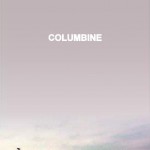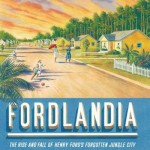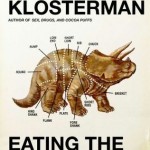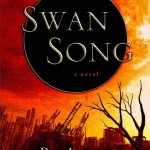




Chuck Klosterman
As I recently wrote, Chuck Klosterman (essayist, pop culture observer, and all-around badass writer) is my new (albeit unsuspecting) writing mentor, but he might also turn out to be some sort of sarcastic xen guru as well. His words have really stuck with me; one set in particular.
Allow me to quote at length from Chuck Klosterman’s Eating the Dinosaur:
“There’s one kind of writing that’s always easy: Picking out something that’s obviously stupid and reiterating how stupid it obviously is. This is the lowest form of criticism, easily accomplished by anyone. And for most of my life, I have tried to avoid this. In fact, I’ve spent an inordinate amount of time searching for the underrated value in ostensibly stupid things. I understand Turtle’s motivation and I would have watched Medellin in the theater. I read Mary Worth every day for a decade. I’ve seen Korn in concert three times and liked them once. I went to The Day After Tomorrow on opening night. I own a very expensive robot that doesn’t do anything. I am open to the possibility that everything has metaphorical merit, and I see no point in sardonically attacking the most predictable failures within any culture.”
This is wonderful from a writing perspective, if nothing else because he literally could have chosen anything from his anecdotally-filled life as a critic, but these perfectly explain his point. However, moving beyond the mechanics, this passage is also kind of genius.
Like Klosterman, I also despise reiterating stupidity, especially for audience approval. It’s like cherry-picking extremist quotes from the political spectrum to gain support for your own cause. And it absolutely infuriates me when this is done with humor.
Once, on my old blog (which was awesome, by the way, but also not entirely appropriate for a Website that also holds my curriculum vita…and my name), I commented on one of the one brazillion Internet top 10 lists (most kind of blend together) where the author made multiple jokes about John Tesh music in the guise of being extreme. Here is what I wrote:
“I hate this: People have the chance to slam someone down and, instead, they wuss out and go with a safe joke. The result is a slew of jokes that sound as controversial as a Jay Leno monologue. Take Gigli…please. There, see how stupid and lame I sound? Are the rabid Gigli fans going to attack me? Of course not–it’s a safe joke. However, if I were to replace Gigli with an honest response like Episode III or LOTR: The Fellowship of the Ring, now we’re cooking with butane. This guy could have picked any band he hated (the more popular, the better), but he didn’t and somehow managed to sound even lamer than he already is.”
I feel strongly in this aspect, but at the same time I can’t shake Klosterman’s approach to his writing (and, most likely, his life). He uses practically everything as a way of examining an artist, a concept, a perceived understanding, or even society. His statements about movies are not based in anger and hate, but rather from a technical side or story construction.
I have to believe that Klosterman hates more than just laugh tracks, but I’m sure it’s nothing on the level of my pet peeves. On the one hand, I love caring passionately about most things (one way or the other) because it means I care and I’m paying attention. Then again, at what point does my reactionary response become…well…moot because it’s so clearly reactionary.
Much to ponder…
Summer Reading
This summer was insanely busy–I taught Introduction to Mass Communication in June, had emergency surgery on my gall bladder six days before my wedding in July, and two conferences (and my honeymoon) in August. It was hectic to say the least.
That said, while on my honeymoon I finally had a chance to do some reading. Some good, old-fashioned reading. Because it was vacation, I didn’t read any scholarly articles or school stuff–it was all just books I felt like reading. It was wonderful. You read so many books for graduate school and so many articles to write publications that reading for fun becomes something relatively rare. It’s not horrible because I’m actually interested in what I study, but I definitely miss run reading–and this summer only made me miss it more.
I read five books in August (most of them on the honeymoon where we had plenty of time for beach-reading) and I was amazed how much I loved them. I figured it couldn’t hurt to mention them just in case anyone was looking for something to check out. So here they are:
 COLUMBINE by Dave Cullen
COLUMBINE by Dave Cullen
Without a doubt, one of the best books I have read in years. Published by a company called “12” (because they only publish 12 books a year), Cullen’s book explores the truths about what actually happened at Columbine while trying to (and succeeding in) answering the all-important question of why this tragedy took place. Cullen actually reported on the infamous school shooting, and his writing is absolutely top notch: strategic use of detail, fast-paced, and utterly, completely compelling. I absolutely tore through the book and have literally recommended it to everyone that I know.
 FORDLANDIA: THE RISE AND FALL OF HENRY FORD’S FORGOTTEN JUNGLE CITY by: Greg Grandin
FORDLANDIA: THE RISE AND FALL OF HENRY FORD’S FORGOTTEN JUNGLE CITY by: Greg Grandin
I’m a sucker for a great history book, especially if it’s well-researched. This one is great because the research is so meticulous, resutling in an intriguing book. Decades ago, in an effort to make the Ford company more independent, Henry Ford purchased a huge tract of land in Brazil to farm rubber trees. While importing rubber, Ford was also interested in exporting his vision for Utopia, and “Fordlandia” was born. This city in the middle of a jungle is the central to the book, though it also archives Ford’s own downward spiral (mirrored by the city’s downfall). The book could have been dry, but is filled with rich anecdotes and a fascinating portrayal not only of Ford, but of cultural arrogance (and obliviousness).
 EATING THE DINOSAUR/SEX, DRUGS AND COCOA PUFFS By: Chuck Klosterman
EATING THE DINOSAUR/SEX, DRUGS AND COCOA PUFFS By: Chuck Klosterman
As a writer, I like to think that, as I grow older, I find new authors to emulate and idolize as a way of making sure my technique and style do not become stale. Chuck Klosterman’s writing is my new Everest. Both of these books are a filled with essays dealing with…well…that’s tough to say. Klosterman uses pop culture phenomena as a platform for what social phenomena they represent. I really only had a total of two essays I disliked, and the rest were fascinating. Klosterman has had this amazing life (music and movie critic for a number of publications) but, more importantly, he has an amazingway of looking at events, behavior, mental processes, and, well, everything. It’s almost completely non-judgmental–so much so that I’m actually writing another blog entry just on that aspect of his work.
 SWAN SONG By: Robert McCammon
SWAN SONG By: Robert McCammon
Ever since I entered graduate school (wow…seven years ago), I’ve really had no patience for fiction books. As for why, I’m sure it’s a variety of reasons. I read nonfiction for research and it tends to be pretty interesting (I study race and ethnicity), so it’s not like there’s a gigantic void of good readings in my life. From a pragmatic standpoint, what I find interesting tends to be what I research, and so reading nonfiction can be double-duty; I’m reading for research and I’m reading for enjoyment. However, I’ve always had a soft spot for post-apocalyptic writing (it was a huge phase for me during high school, starting with Alas, Babylon and ending with Farnham’s Freehold), and so I figured I’d give Swan Song a shot. And I’m glad that I did.
Swan Song is basically The Stand, only instead of a plague, it is nuclear holocaust that destroys civilization. It is a story about survivors and how those survivors ultimately end up in a showdown of good vs. evil. However, the characters are wonderfully written, the visuals are imaginative, the pacing is fast, and it truly is a masterpiece. The two main things I liked? While “evil” played a significant role, there was little mention of God, Jesus, scripture, and a minimal amount of prayer–the author truly let the humans battle for humanity, rather than having the survivors serve as pawns for higher powers. Secondly, I loved that it was such a dark book–unlike something like The Stand, where everything (except 99% of the population) is intact, in Swan Song the human population is practically obliterated and the nuclear attack decimates the landscape. THis is definitely worth a read.
Even if you only check out one of these books, I’m certain you won’t be disappointed. It was wonderful to have some time to read again, and I don’t think I could have asked for a better combination of books to get back into things.